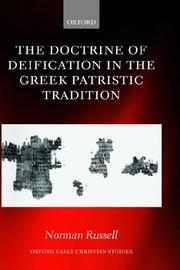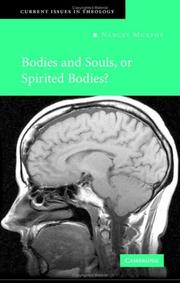| Listing 1 - 2 of 2 |
Sort by
|

ISBN: 0199265216 9780199205974 9780199265213 0191695637 0199205973 1280965177 0191532711 9786610965175 Year: 2006 Publisher: Oxford : Oxford university press,
Abstract | Keywords | Export | Availability | Bookmark
 Loading...
Loading...Choose an application
- Reference Manager
- EndNote
- RefWorks (Direct export to RefWorks)
Deification in the Greek patristic tradition was the fulfillment of the destiny for which humanity was created - not merely salvation from sin but entry into the fullness of the divine life of the Trinity. This book, the first on the subject for over sixty years, traces the history of deification from its birth as a second-century metaphor with biblical roots to its maturity as a doctrine central to the spiritual life of the Byzantine Church. Drawing attention to the richness and diversity of the patristic approaches from Irenaeus to Maximus the Confessor, Norman Russell offers a full discussion of the background and context of the doctrine, at the same time highlighting its distinctively Christian character.
Deification (Christianity) --- History of doctrines --- Histoy of doctrines --- 233.5 --- Natuur van de mens. Ziel --- 233.5 Natuur van de mens. Ziel --- Theosis (Christianity) --- Salvation --- Christianity --- Patrology --- Primitive and early church, ca. 30-600 A.D. --- Deification (Christianity) - Histoy of doctrines - Early church, ca. 30-600.

ISBN: 9780511802805 9780521859448 9780521676762 9780511349379 0511349378 051134841X 9780511348419 0511802803 0521859441 0521676762 1107156319 1281085448 9786611085445 0511347448 0511350252 051156886X Year: 2006 Publisher: Cambridge : Cambridge University Press,
Abstract | Keywords | Export | Availability | Bookmark
 Loading...
Loading...Choose an application
- Reference Manager
- EndNote
- RefWorks (Direct export to RefWorks)
Are humans composed of a body and a nonmaterial mind or soul, or are we purely physical beings? Opinion is sharply divided over this issue. In this clear and concise book, Nancey Murphy argues for a physicalist account, but one that does not diminish traditional views of humans as rational, moral, and capable of relating to God. This position is motivated not only by developments in science and philosophy, but also by biblical studies and Christian theology. The reader is invited to appreciate the ways in which organisms are more than the sum of their parts. That higher human capacities such as morality, free will, and religious awareness emerge from our neurobiological complexity and develop through our relation to others, to our cultural inheritance, and, most importantly, to God. Murphy addresses the questions of human uniqueness, religious experience, and personal identity before and after bodily resurrection.
Mind and body --- Soul --- Theological anthropology --- 233.5 --- 233.5 Natuur van de mens. Ziel --- Natuur van de mens. Ziel --- Anthropology, Doctrinal --- Anthropology, Theological --- Body and soul (Theology) --- Doctrinal anthropology --- Humanity, Doctrine of --- Man, Doctrine of --- Man (Theology) --- Mankind, Doctrine of --- Religion --- Pneuma --- Future life --- Philosophical anthropology --- Animism --- Spirit --- Body and mind --- Body and soul (Philosophy) --- Human body --- Mind --- Mind-body connection --- Mind-body relations --- Mind-cure --- Somatopsychics --- Brain --- Dualism --- Holistic medicine --- Mental healing --- Parousia (Philosophy) --- Phrenology --- Psychophysiology --- Self --- Psychological aspects --- Soul. --- Mind and body. --- Theological anthropology. --- Arts and Humanities
| Listing 1 - 2 of 2 |
Sort by
|

 Search
Search Feedback
Feedback About
About Help
Help News
News